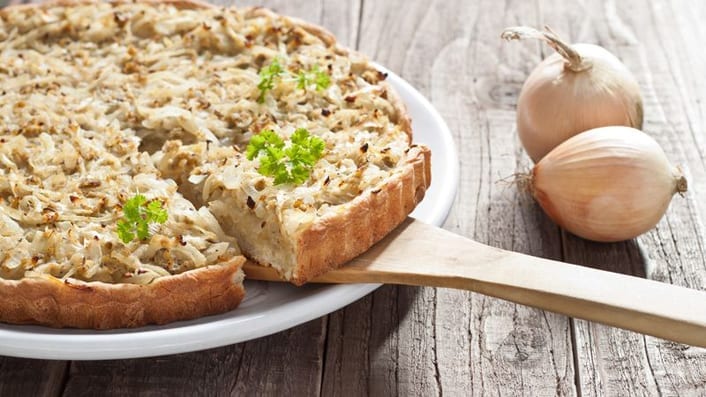Big or small, round or oval, red or white – onions are the perfect ingredient to enhance a great many dishes. They sometimes make us cry and yet, on the other hand, they’re known for their healing properties. What’s going on with these bulbs? Read on to find out more.
Some people like their food hot, others prefer it mild – the onion manages to bring out the best flavours in both worlds and, along with the tomato, it is one of the most commonly eaten vegetables. In the UK, for example, the average person consumes about 9kg of onions per year.
The onion is a member of the leek family and is one of the oldest vegetable crops. It originated in Central and Western Asia, and was introduced to Central Europe by the Romans, who regarded it as a valuable plant in terms of its medicinal and seasoning qualities, and as a vegetable in its own right. And, it has retained its popularity and its healthy reputation to this very day – so much so that it was voted medicinal plant of the year back in 2015. This accolade helped put the humble onion’s health benefits back into the limelight again. This unimposing vegetable has a host of medicinal properties: onions are packed with vitamins, minerals and trace elements, and they contain particularly high levels of essential sulphuric oils and other natural substances.
The mustard oils found in onions stimulate the stomach’s inner mucous membranes and digestive glands, thereby stimulating appetite. They also benefit the liver, gall bladder, pancreas, kidneys and bladder. To fully unleash their healing powers, onions should be chopped, diced or sliced before being eaten because their ‘healing sulphides’ can only be released when the onion tissue is destroyed.
As we chop onions, the side effect of this destruction of tissue is that the ensuing release of sulphur compounds makes tears spring to our eyes. This is the price that this healthy and healing plant asks us to pay! Our tip: sharpen your knives as, the sharper the blade, the fewer tears you will shed. Why? With a sharp knife, the onion cells remain largely intact, as you do not have to press so hard when cutting and fewer sulphur compounds are released.
Regardless of their health benefits, it would be hard for a lot of people to imagine cooking without onions. Onions are seen as an indispensable ingredient and, without them, dishes can taste rather bland. As a vegetable or as a seasoning; raw, cooked, roasted, steamed or stewed; cut into cubes, rings or slices – only the flavour-enhancing onion gives some recipes that necessary ‘je ne sais quoi’, as well as producing a tasty onion tart or a hearty onion soup.
To keep onions fresh for as long as possible, store them in a refrigerator, where they will keep for up to 15 days. In a Liebherr BioFresh compartment, they can be stored for up to 28 days. Prepared, raw onions are also ideal for freezing and can be stored in a freezer for up to 6 months. When you’re short of time, just add your pre-cut frozen onions to your meat and vegetable dishes to create scrumptious, deliciously-seasoned meals in next to no time!
Bon appétit!
What are your favourite dishes with onions? Please share your favourite recipes with us. Use the comment function below this post or start/join in discussions with us on Facebook and Twitter.
